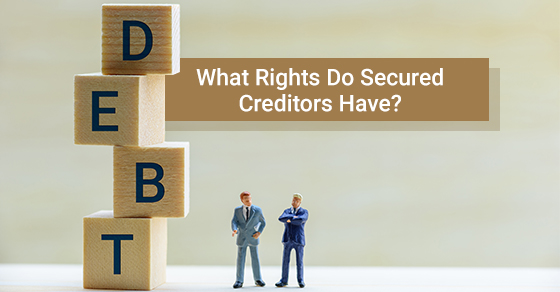When one is forced to contemplate filing for bankruptcy, it’s an important process that is not entered into lightly. Contrary to popular belief, not everything you own is seized when you file for bankruptcy. Not only is there a long list of assets that are exempt from seizure, but there is also a hierarchy among your creditors as well. Their relationship to you will determine how much of the money you owe they will receive (if any).
Unsecured Creditors
Unsecured creditors are those creditors to whom you owe a debt that is not related to any assets you may own. Examples of unsecured debts include credit cards, lines of credit, consolidation loans, utility bills and even old bills for services you no longer use.
When you buy something with a credit card, the merchant doesn’t register a lien on that item and the credit card company doesn’t have the right to seize your purchases if you don’t pay your credit card bill. It’s this risk of not being able to recover their money that they charge much higher rates of interest than a conventional bank loan or mortgage.
In the case of utility companies, they can simply decide to disconnect your service but they can’t go after assets to recover the money you owe. If you file for bankruptcy and owe a debt to a utility company, they cannot refuse you service if they are the only utility provider in your area, however, they are not obligated to offer you service on a credit basis, and you may have to pay for services up front or remit a deposit to the company to get service.
If your debt becomes too large and attempts to resolve the issue are unsuccessful then a credit card company can take you to court and obtain a judgement against you, which could result in a lien being placed on assets such as your home that is why it is always easier to try and deal with your financial problems before this happens.
Unsecured Creditor Rights During Bankruptcy
A proven unsecured creditor has the right s ask questions related to your filing and the circumstance that led you to a bankruptcy. They also have the right to oppose your discharge if they feel you have done something unfair or that requires additional investigation.
Secured Creditors
Secured creditors are creditors to whom you owe a debt and who have a lien on your property. That is to say, the creditor retains a registered interest in the asset or property until it is fully paid for. The most common examples of secured debt are mortgages and car loans. A business loan where you put up your house and/or any other asset as collateral would be another example. Other creditors such as; leasing company, a rent-to-own company, or a finance company, may also require security on their loans but a trustee can help you sort through the information to determine. All of these are called voluntary liens, meaning the borrower willingly entered into an agreement with the lender. Other types of secured debt are involuntary liens, such as described in the paragraph above when an unsecured creditor sues and wins a judgement.
You are not protected from a secured debt in bankruptcy proceedings unless you give up the security. It’s important to understand that if you have any secured debts at the time you file bankruptcy, if you want to keep them the secured item you will still have to keep making the agreed-upon payments on that debt they hold as security. A secured creditor, by law, cannot end your contract because you filed for bankruptcy. However, if you are unable to continue making those payments they can then take action to seize the assets you pledged as security for the loan you received.
Secured Creditor Rights During Bankruptcy
If you are continuing to make payments to your secured creditor after you file for bankruptcy then generally your business with them continues as usual. If you decide to give up the asset when you file for bankruptcy then that creditor will have to deal with the trustee directly so resolve the situation.
As an example, suppose a debtor in bankruptcy owns a summer cottage with $150,000 remaining on the mortgage. Because the bank that holds the mortgage is a secured creditor, when the bankruptcy trustee sells the property, the bank gets their money first. So, if said cottage is sold for say, $250,000, then the bank receives the $150,000 still owed on the mortgage with the rest being distributed to the other claimants as per priority rules.
In addition, if the secured creditor believes that it will lose money as a result of a trustee holding a property in bankruptcy it can petition the court to force the trustee — or debtor — to either make payments to cover any potential losses or release the property. If you have a secured debt, the trustee must determine if that asset has any value for creditors, and if so, obtain that amount either from the sale of that asset or by having the debtor do so and pay the trustee the equity or value of that asset. Either way, the creditor secured on a particular is taken care of first when it comes to proceeds from said item.
For more information about your rights during bankruptcy, call Kevin Thatcher toll-free at 1-866-719-8547 or contact us here.

